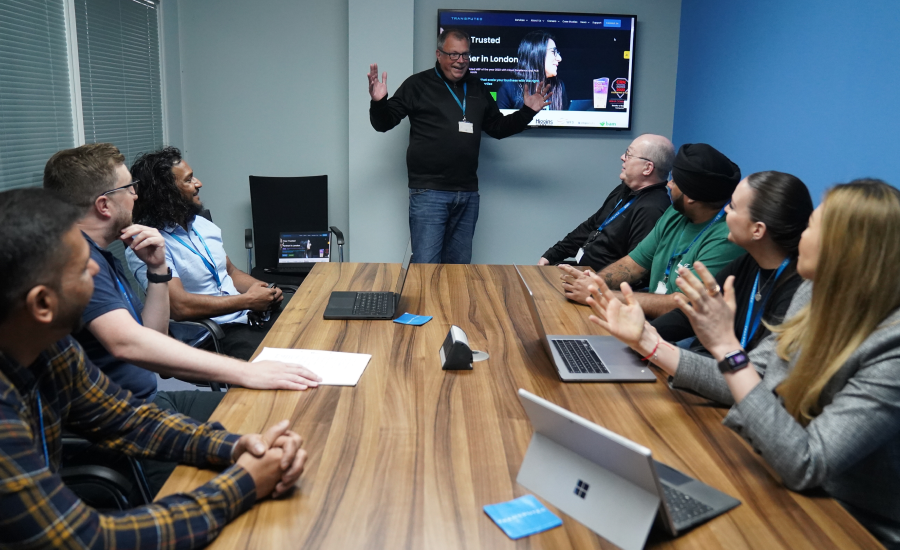Written by KRITIKA SINHA | MARKETING
Managing IT projects effectively is crucial for the success of any organisation. With advancements and complexities in tech solutions, robust IT project management ensures timely delivery, cost-efficiency, and the realisation of business objectives. At Transputec, we understand the intricacies of IT projects and have honed our strategies to deliver unparalleled results. In this blog, we delve into the key strategies for IT project management that set successful projects apart from the rest.
Master Your Projects with our IT Project Management
Transputec ensures the success of your IT initiatives with IT Project Management services. Our experienced team of project managers specialises in planning, executing, and delivering projects on time and within budget, tailored to your specific business needs.
Our comprehensive approach covers every phase of project management, from initial consultation and scope definition to resource allocation, risk management, and final delivery.
What is IT Project Management?
IT project management involves planning, executing, and overseeing IT projects to meet specific objectives. These projects can range from software development to network upgrades and cybersecurity implementations. Effective IT project management ensures that all project components align with business goals, providing maximum value and return on investment. The Importance of IT Project Management:
- Enhanced Efficiency: Streamlined processes and clear workflows minimise delays and optimise resource utilisation.
- Risk Mitigation: Proactive risk management identifies potential issues early, allowing for timely resolutions.
- Quality Assurance: Rigorous quality control measures ensure deliverables meet or exceed expectations.
- Stakeholder Satisfaction: Clear communication and regular updates keep stakeholders informed and satisfied.
“At Transputec, we understand the unique challenges of IT projects and possess the expertise to guide your project through every stage, from conception to implementation."
Key Strategies for IT Project Management
1. Clear Project Objectives and Requirements:
- Define the project scope, objectives, and deliverables.
- Ensure all stakeholders agree on the project goals and requirements.
- Use SMART criteria (Specific, Measurable, Achievable, Relevant, Time-bound) for setting project objectives.
2. Robust Project Planning:
- Develop a comprehensive project plan detailing tasks, timelines, resources, and milestones.
- Use project management tools like Gantt charts, PERT diagrams, or Kanban boards to visualise the project timeline and dependencies.
- Plan for potential risks and create contingency plans.
3. Effective Communication:
- Establish clear communication channels among team members, stakeholders, and management.
- Conduct regular status meetings to update on progress, discuss issues, and realign the team.
- Use collaborative tools and platforms to facilitate continuous communication and document sharing.
4. Resource Management:
- Allocate resources efficiently, ensuring the right skills are matched to the right tasks.
- Monitor resource utilisation and adjust allocations as necessary to avoid bottlenecks or underutilisation.
- Ensure team members have access to the necessary tools and training.
5. Risk Management:
- Identify potential risks early in the project and assess their impact and likelihood.
- Develop a risk management plan that includes mitigation strategies and response plans.
- Regularly review and update the risk register as the project progresses.
6. Quality Assurance:
- Implement quality control processes to ensure deliverables meet the required standards.
- Conduct regular testing and reviews to identify and address issues early.
- Engage stakeholders in the review process to ensure their expectations are met.
7. Change Management:
- Establish a formal process for managing changes to project scope, requirements, or timelines.
- Assess the impact of changes on the project’s objectives, schedule, and resources before approval.
- Communicate changes promptly to all stakeholders and adjust plans accordingly.
8. Performance Monitoring and Reporting:
- Track project progress against the baseline plan using key performance indicators (KPIs).
- Use project management software to gather and analyse data on project performance.
- Provide regular, transparent reports to stakeholders, highlighting progress, issues, and next steps.
Would You like Assistance with IT Project Management?
Connect with us today for our free consultation!
Why Use Transputec for IT Project Management?
1. Expertise and Experience
With over three decades of experience, Transputec has managed a wide range of IT projects across various industries. Our deep understanding of industry standards and best practices ensures your project’s success.
2. Tailored Solutions
We recognise that every business is unique. Our IT consultancy services are tailored to meet your specific needs, ensuring solutions that align with your strategic goals.
3. Proven Track Record
Our case studies showcase numerous successful projects delivered on time and within budget. Our commitment to excellence and customer satisfaction sets us apart as a reliable IT project management partner.
4. Cutting-Edge Technology
At Transputec, we leverage the latest technologies and tools to streamline project management processes, enhance productivity, and deliver superior results.
Conclusion
Mastering key strategies for IT project management is essential for navigating the complexities of modern technology projects. At Transputec, we’re committed to helping you implement these strategies effectively, ensuring your IT initiatives drive real business value.
Ready to transform your IT project management approach? Contact us today to speak with an expert and discover how Transputec can help you achieve your IT project goals.

Ready to Transform your IT Project Management Approach?
Schedule a call with our team of experts today.
FAQs
What are the key phases of IT project management?
The key phases include initiation, planning, execution, monitoring and controlling, and closing. Each phase plays a vital role in ensuring project success.
How does Agile methodology benefit IT project management?
Agile methodology promotes flexibility, continuous improvement, and faster delivery of project components. It allows teams to respond to changes efficiently and deliver value incrementally.
What tools are essential for IT project management?
Essential tools include project management software like Asana, JIRA, Microsoft Project, and collaboration tools like Slack and Microsoft Teams. These tools facilitate task management, communication, and tracking.
How does Transputec ensure project quality?
Transputec employs rigorous quality assurance practices, including continuous testing, peer reviews, and stakeholder feedback to ensure deliverables meet the highest standards.
Why is stakeholder communication important in IT project management?
Effective communication ensures that all stakeholders are informed, aligned, and engaged throughout the project lifecycle. It helps in managing expectations and addressing concerns promptly, leading to higher satisfaction and project success.







